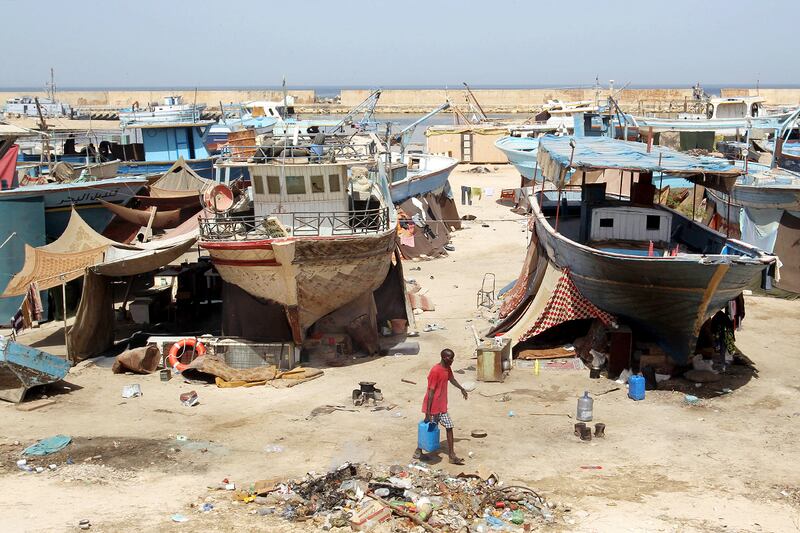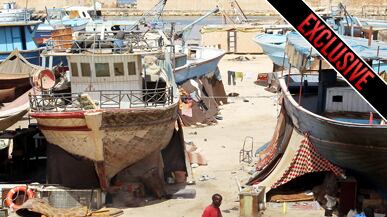In a move that mirrors Egypt’s controversial crackdown on foreign and domestic nongovernmental organizations earlier this year, Libyan authorities are aiming to cut the financial lifeline of the country’s fledgling civil society.
A new law scheduled to take effect from June 1 will ban domestic NGOs from receiving any money from foreign counterparts and partners, including from American pro-democracy NGOs and charities.

Separately, some foreign NGO workers focusing on reconciliation issues—and who have been traveling to towns in the south affected by continuing sporadic violence—are now being told they can’t travel outside the Libyan capital until they have registered their organizations with the Ministry of Culture and Civil Society.
However, when trying to register, several foreign NGOs, including the European NGO International Institute for Democracy and Electoral Assistance, have found that their paperwork goes missing after they have formally submitted their applications.
A ministry official declined to comment.
Under the new law, domestic NGOs can only receive funding from foreign NGOs or charities that are registered in Libya. In-kind contributions, though, will be unaffected.
The planned ban on foreign funding of domestic Libyan civil society groups comes just weeks away from national elections slated for June 19 for a new interim government that will be charged with drafting a constitution for post-Gaddafi Libya.
Western diplomats expect Islamist parties to do well in the election. They say the seven-month-long transitional government has been marked by a behind-the-scenes struggle between liberal-minded progressives, well-organized Islamists, and a business and administrative elite disparagingly nicknamed tahaleb, or seaweed, by ordinary Libyans.
Ministry officials have told domestic NGO leaders that the law’s purpose is to prevent financial fraud, and that neither the ministry nor the domestic NGOs have the capacity to mount proper audits, say NGO workers. Libyan civil society leaders have responded that the donors themselves normally have mechanisms for rigorous auditing.
“This will affect us greatly,” says Hussam Hussein Zagaar, the director of the media development NGO the Free Media Center.
The move on domestic NGO funding is reminiscent of this past winter, when Egyptian authorities—in the runup to presidential polls there—kicked off their own crackdown on foreign NGOs, eventually expelling pro-democracy American NGOs, including the U.S. Congress-funded National Democratic Institute and the International Republican Institute.
In February, Egyptian authorities charged 43 workers from five foreign NGOs with obtaining international funds illegally and failing to register their organizations. One of those charged was the son of U.S. Transportation Secretary Ray LaHood. The move sparked a crisis in relations with the U.S., but some of the tension between Washington D.C. and Cairo lessened when an Egyptian judge subsequently allowed the foreign defendants to leave the country.
Amnesty International researcher Diana Eltahawi says she has noticed changes in Libyan authorities in the last few weeks that remind her of what unfolded in Egypt. “This week was the first time I was accused of being a Western spy,” she says. “There’s been a shift in attitude towards the NGOs and foreign journalists.”
Amnesty has been investigating torture allegations leveled against the Libyan authorities and dozens of militias that remain independent of the government. The human-rights organization has documented 20 deaths in custody since August and has urged the governing National Transitional Council to secure control of all detention centers in the country.
Along with Western diplomats and other foreign NGOs, Amnesty has raised concern about a series of laws the NTC has issued recently including a law that grants immunity to rebels for any crimes committed during the insurrection. Another law, described by Amnesty’s Eltahawi as “encouraging carte blanche abuse,” instructs the country’s courts to accept as evidence confessions extracted through torture.
Last Friday, Amnesty International Secretary-General Salil Shetty criticized the new government in Libya, saying that in some cases the new authorities were behaving almost as badly as the regime of the ousted Muammar Gaddafi.
During a visit to London last week, Libya’s transitional Prime Minister Abdurrahim El-Kib said that some of the laws that international NGOs have criticized will “disappear from the scene” following the June national elections.
But human-rights and civil-society activists, who fear the Libyan authorities are trying to box them in, question why the laws they object to can’t be withdrawn now and how the outgoing prime minister can determine what a new interim administration and assembly will do.
As well as moving to impose restrictions on civil-society groups, the Libyan authorities have also issued a series of laws “organizing” Libya’s media sector involving the setting up of a Supreme Media Authority tasked with protecting the media’s “freedom and independence” but of also ensuring the “protection of national unity and social peace.”
Journalists from the dozens of new newspapers and magazines that have launched since the ouster of Gaddafi say they were not consulted on the law and have held demonstrations, arguing that it is not up to government to organize the media.
A British diplomat concedes that the future political direction of Libya hangs in the balance between being an open society or a more closed and controlled one. “It is unclear which way it will fall,” the diplomat says.





